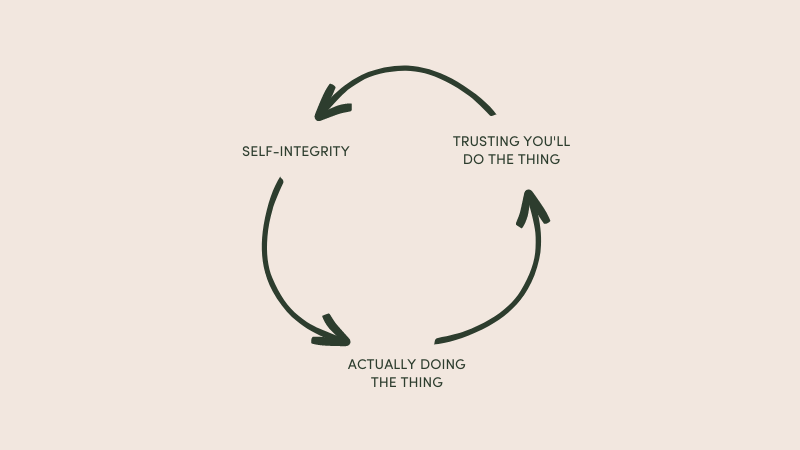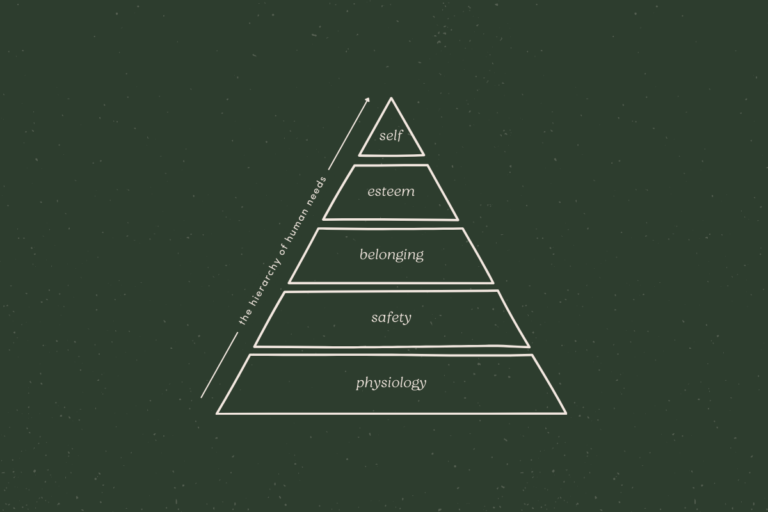
There is one habit that is crucial when it comes to taking action and achieving goals – and we’re definitely not talking about it enough.
For most of us, it’s also the main reason we struggle so much with taking action on our goals. It affects our motivation and ability to follow through on anything. If we manage to address and nurture this habit, we theoretically have the ability to reach any goal and take action on any intention we set.
What is this magical habit, you ask? Well, your self-integrity of course. In other words, your ability to follow through on your commitments to yourself.
Setting intentions vs. making progress
If you’re into self-development, chances are you’re already doing a lot of the things people in the space tell you to do:
- You have a vision of who you want to be
- You’re setting goals in alignment with that vision
- You know what habits are necessary to achieve your goals
- You’re writing endless to-do lists filled with actionable steps
Many (if not most) of us, are doing all of these things, yet we’re still not taking action. It doesn’t matter that we’ve put something in our calendar or on our to-do list – we just move it over to the next day. It doesn’t matter if we didn’t reach a particular goal – we’ll just set a new one or tell ourselves we’ll do it next month.
Sound familiar? Turns out, planning and being intentional is useless when we don’t have the self-integrity to follow through. These things are definitely important, but they only lay out the path towards accomplishing your goals. Self-integrity is the actual fuel that is needed to get you to follow that path.
Being in motion is not the same as being in action
After doing some research on the topic of self-integrity, I found that habit expert James Clear explained this exact phenomenon very nicely. He describes it as the difference between being in motion, and being in action:
When you’re in motion, you’re planning and strategizing and learning. Those are all good things, but they don’t produce a result. Action, on the other hand, is the type of behavior that will deliver an outcome. […] Sometimes motion is useful, but it will never produce an outcome by itself. It doesn’t matter how many times you go talk to the personal trainer, that motion will never get you in shape. Only the action of working out will get the result you’re looking to achieve.
So why do we spend so much time planning rather than doing? According to James Clear, being in motion is an easy way to convince yourself that you’re still making progress. You feel like you’re getting things done, without having to do the hard stuff and risking failure.
But if we are to go from being in motion to being in action, we need self-integrity.
Why do we struggle so much with self-integrity?
Before getting into some self-integrity tips, it’s important to understand why so many of us lack it in the first place.
Self-integrity is essentially a feedback-loop. The more self-integrity you have, the easier it will be for you to actually do what you say you’re going to do, which in turn will build up your self-integrity even more. Conversely, the less self-integrity you have, the harder it will be to take action, which will further damage your self-integrity. It’s both a virtuous circle, and a vicious circle.

Every time you don’t follow through on your goals, don’t stick to your calendar or neglect your to-do’s, it slowly degrades your self-integrity. In the long run, this is really damaging.
If this sounds like a stretch, consider this: what would happen if you treated a commitment to a friend, the same way you treat a commitment to yourself? You would never make a promise to a friend and then just flake (assuming you’re, you know, a nice person). Yet when it comes to ourselves, we flake all the time. We can’t seem to consistently show up for ourselves, no matter how badly we think we want to.
When you repeatedly set intentions and don’t follow through on them, you’re teaching your subconscious that your commitments to yourself don’t matter. As a result you lose trust in yourself, just like you wouldn’t trust an unreliable friend who never shows up to your coffee date.
Enter the downward spiral that makes it harder and harder to stick to commitments. You’ve taught your mind that your promises to yourself are optional and have no value, so the next time you set an intention, why would you take it seriously? Reaching goals becomes impossible when we don’t trust ourselves.
Our (lack of) action influences our beliefs
We know that our beliefs determine our actions. What a lot of people don’t realize, is that this also works the other way around: our actions and habits tell us who we are and what we believe. They form our identity and the way we view ourselves.
In fact, when our actions don’t line up with our beliefs, we tend to change our beliefs to match our actions. This is due to a psychological concept called Cognitive Dissonance. According to this principle, we have an inner drive to keep harmony between our beliefs and behavior, and avoid any disharmony. When there is an inconsistency between our beliefs and behaviors, something must change to eliminate the friction. Most of the time, we will end up changing our beliefs.
In other words, when your actions don’t align with the belief “commitments to myself matter”, you will automatically start believing that they don’t.
7 self-integrity tips
So how do we fix a lack of self-integrity? Well, the only way to retrain your mind is by showing it you do care about commitments and they do matter. I’m not going to lie – it’s not easy. Which is why a lot of us are so bad at it.
Rewiring your brain and beliefs simply requires action, which requires some cold, hard discipline. That being said, following through on your commitments is only one habit. Everyone can cultivate one, single habit.
Here are 7 tips to help you cultivate self-integrity:
1. Write your commitments down on paper.
If you haven’t yet gotten into the habit of writing down your commitments, that’s where you’ll want to start. A study at Dominican University found that people who wrote down their goals accomplished significantly more than those who did not write them down.
Try using the following formula: I commit to [action + time + place].
For example, this is what one of my commitments looks like: I commit to practice yoga every morning at 8 A.M. on my yoga mat in the living room.
I recommend writing commitments down on paper instead of digitally, simply because it’s more ‘final’ and feels more tangible. As much as I love my digital tools, I want my commitment to exist physically in the real world. Try putting the commitment in a place where you’ll see it often (e.g. use post-its and stick them to your computer monitor or mirror).
Another smart strategy is sharing your commitment somewhere where others can see it and keep you accountable.
2. Start super small.
Just like you taught your mind that your commitments didn’t matter, you now need to teach it that they do. Teaching yourself to commit takes commitment in itself (this should be a drinking game), so start with teeny-tiny promises you can easily keep, and move up from there.
Drink a glass of water every day when you wake up. Make your bed in the morning. Think of one thing you’re grateful for before going to bed. Read one page of a book. Whatever floats your boat and is manageable for you.
3. Get married to your calendar.
Calendars are a great tool, because by definition they treat anything you put in it as a commitment with a time and place. This also makes building self-integrity a lot more concrete: your new habit is now to simply stick to your calendar.
Any habit or actionable step towards your goal should be on your calendar, and anything that’s on it is not an option. I personally use and love Google Calendar, but an analogue calendar works great too (especially because you can’t move things around).
If you use a digital calendar, I suggest starting with a clean slate. Any old repeating events you may have flaked on before (I’m looking at you “A.M. workout”) need to go – we don’t need that kind of energy lingering in our calendar. Out with the old, in with the new.
You can turn on some music, light a candle… Spend some time setting up a calendar that excites you and that you can actually follow. Color code it, add emoji’s – make it fun, but keep it attainable.
4. Treat your commitments like meetings.
From now on, when you set an intention, that becomes an appointment with yourself. It should be no different from an appointment with a friend, the dentist or your manager.
If you have a digital calendar, a strange but smart strategy is to actually invite yourself and then accept the invitation beforehand. This will serve as a reminder that you are relying on yourself to show up. Add a specific time and even a location, like “bathroom”, “local park” or “yoga mat”.
All you need to do is get to the right place at the right time, and let the meeting begin!
5. Put yourself first.
If someone wants your time at a moment that you had a personal commitment scheduled – say no. You already have a meeting – with yourself. This is difficult for a lot of us, but consider what consistently letting other people come before yourself is teaching your subconscious. You deserve to show up for yourself.
At the end of the day, this comes down to self-love. It may sound cheesy, but in order to keep promises to yourself you need to love and respect yourself.
Although “I’m working on personal goals” or “I’m making time for self-care” are perfectly valid reasons to say no to something, we tend to feel like they aren’t acceptable. The great thing is, you don’t need to give people a reason or explanation when you say no, at all. Just say you can’t right now, and offer to make plans some other time (if you feel like it).
6. Embrace resistance.
This is where the cold, hard discipline comes in.
When it comes to sticking to your commitments, you will inevitably face the same resistance you faced before. You can make it easier to stay on track by learning to embrace resistance.
Seek out small moments of resistance throughout the day to train yourself to push through them. Take the stairs instead of the elevator. Turn the water cold right before hopping out of the shower. Practice getting up immediately after your alarm. This will help you build the discipline that you need to show up for yourself in bigger ways.
7. Know your tendency.
We all want to be the person who says “I’m going to do this” – and then just does it. The truth is, this comes easier to some than to others.
Gretchen Rubin – author and queen of all things happiness and habits – figured out that we all have a natural tendency when it comes to our commitments. Some people respond very easily to inner expectations, while others struggle with them. Finding out your tendency will help you find strategies to help you take action.
For instance, as an Obliger I naturally struggle with commitments I set for myself. Therefore, creating systems of external accountability is a strategy I try to implement as much as possible.
~~~
Hopefully this article helped shed some light on why you might be having trouble making progress on your goals, and motivated you to start building up that self-integrity.
I’m going to leave you with a powerful quote to ponder:
“Promise is a big word. It either makes something or it breaks everything”.





